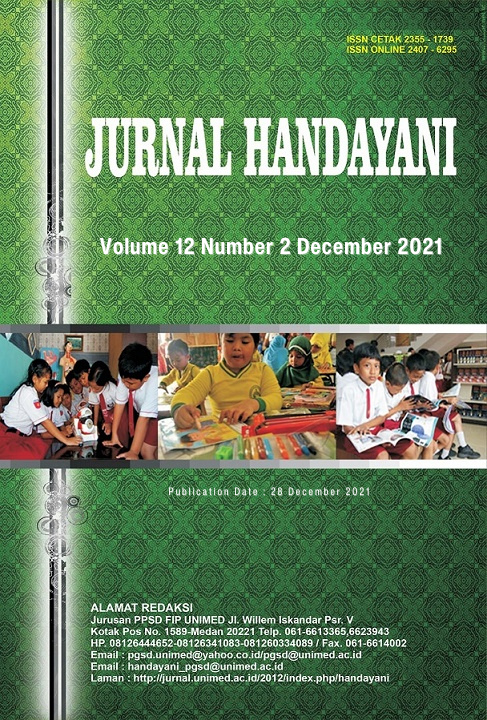Abstract
Abstract : The Effect of Parental Guidance on the Learning Outcomes of Fifth Grade Students of SD Negeri 157641 Masnauli 2. This study aims to determine the effect of parental guidance on the learning outcomes of fifth grade students of SD Negeri 157641 Masnauli 2. This type of research is quantitative research, while the sample in This research is all students of class V SD Negeri 157641 Masnauli 2 which there are 3 classes. Class V-A has 40 students, class V-B has 41 students, and class V-C has 43 students. So the total sample in this study was 124 students. There are three data collection techniques used in this study, namely by using: questionnaires, documentation, and interviews. The discussion in this study shows that the guidance of parents with their children is generally categorized as good. This is indicated by the correlation between the relationship between parental guidance and the learning outcomes of fifth grade students of SD Negeri 157641 Masnauli 2 of 0.786, if the results are interpreted simply by matching the results of calculations with the correlation index number r product moment, it turns out that from the results of the correlation of parental guidance with learning outcomes located between 0.60 - 0.799 which means that between parental guidance and student learning outcomes has a strong correlation or relationship. Keywords: Parental Guidance, Learning Outcomes Abstrak : Pengaruh Bimbingan Orang Tua Terhadap Hasil Belajar Siswa Kelas V SD Negeri 157641 Masnauli 2. Penelitian ini bertujuan untuk mengetahui adanya pengaruh bimbingan orang tua dengah hasil belajar siswa kelas V SD Negeri 157641 Masnauli 2. Jenis penelitian ini adalah penelitian kuantitatif, adapun sampel dalam penelitian ini adalah seluruh siswa kelas V SD Negeri 157641 Masnauli 2 yang terdapat 3 kelas. Kelas V-A berjumlah 40 orang siswa, kelas V-B berjumlah 41 orang siswa, dan kelas V-C berjumlah 43 orang siswa. Jadi total sampel dalam penelitian ini adalah sebanyak 124 orang siswa. Teknik pengumpulan data yang digunakan dalam penelitian ini ada tiga, yaitu dengan menggunakan: angket, dokumentasi, dan wawancara. Pembahasan dalam penelitian ini menunjukkan bahwa bimbingan orang tua dengan anaknya secara umum dikategorikan baik. Hal ini ditunjukkan dari hasil korelasi antara hubungan bimbingan orang tua dengan hasil belajar siswa kelas V SD Negeri 157641 Masnauli 2 sebesar 0,786, apabila hasil tersebut diinterprestasikan secara sederhana dengan mencocokkan hasil perhitungan dengan angka indeks korelasi r product moment, ternyata dari hasil korelasi bimbingan orang tua dengan hasil belajar terletak antar 0,60 “ 0,799 yang berarti antara bimbingan orang tua dengan hasil belajar siswa memiliki korelasi atau hubungan yang kuat. Kata Kunci: Bimbingan Orang Tua, Hasil Belajar


